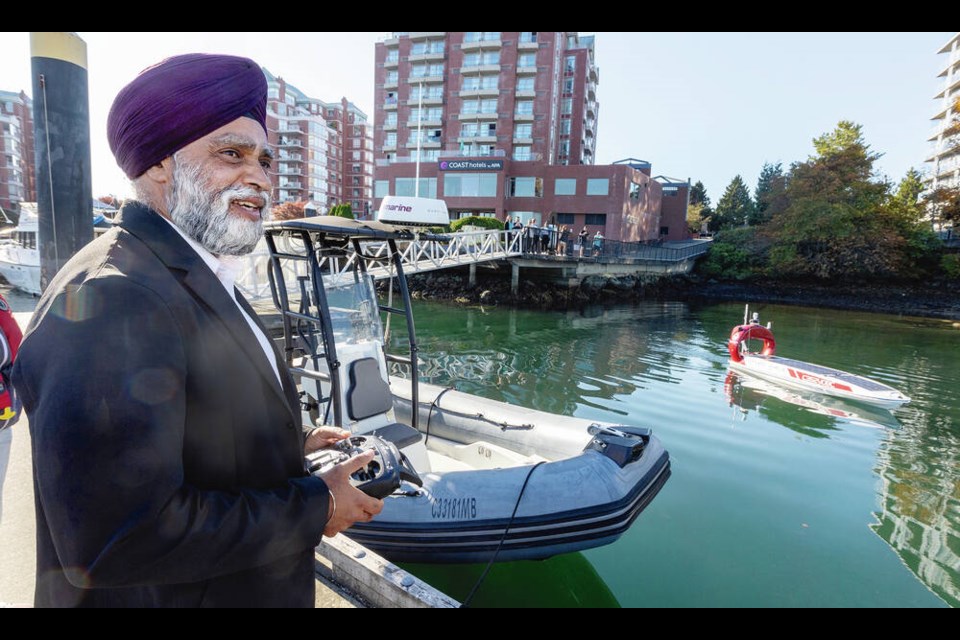Harjit Sajjan took a sleek, robotic vessel packed with solar panels, cameras and sensors for a little spin in the Inner Harbour on Thursday.
The federal minister of emergency preparedness maneuvered the Data Xplorer on a few turns and reverses with a hand-held remote control, and later watched it operated from a laptop inside the James Bay office of Open Ocean Robotics.
Sajjan said he was impressed with the potential of the Data Xplorer to gather environmental data, and also for security, sovereignty and law enforcement on Canada’s three coasts.
A former detective in the gang unit with the Vancouver police, a soldier and former minister of defence, Sajjan said the technology built by the Victoria-based company is a valuable tool for multiple agencies in Canada and around the world.
“This technology is essential in marine domain awareness … it can tell us what’s out there, if it’s legitimate or not,” said Sajjan, who announced $800,000 in federal funding that will allow Open Ocean Robotics to scale up production of the uncrewed vessel.
“Our goal in Canada is having that awareness from space with satellites all the way to under water, so each system, including this technology, is going to play a role, especially in the Arctic.”
The Data Xplorer is electric, powered by solar panels. It’s quiet, can operate day or night and, with various sensors and cameras depending on its use, can feed information to users in real time. A patented roll-bar allows the vessel to right itself in any sea state.
Sajjan said the Canadian military and police agencies like the RCMP are interested in the vessel. “Organized crime, even in these waters, use very creative ways of moving their illicit drugs and goods — even using small submarines,” said Sajjan. “So having these type of tools plays a very important role. This type of technology will enable us to put the right asset on anything that’s illegal.”
Sajjan said he also expects to see interest from countries seeking to crack down on things like illegal fishing. Fritz Stahr, chief technology officer at Open Ocean Robotics, said the federal funding will help the company ramp up production of its robotic vessels, open new markets and elevate the Island as a hub for marine technologies and environmental stewardship.
The company moved to its 12,000-square-foot facility last year, thanks to a previous round of federal funding, and now has 25 staff and will likely add more in the coming months, he said.
Stahr said the vessels start at about $178,000, plus the subscription to its cloud-based data portal system for real-time data and vessel operations.
Each of the vessels can be outfitted according to the use, which the company calls “missions.” Those include research and environmental monitoring, aquaculture, offshore energy monitoring on wind farms and maritime domain awareness for security.
Stahr said Open Ocean Robotics vessels are already working with the U.S. navy’s Task Force 59, a dedicated unit for unmanned systems and artificial intelligence, in its Middle East operation.
Sajjan said Canada has been part of previous missions with Task Force 59, which recently saw one of the “largest seizure of drugs that would go to fund terrorist activities in that area.”
“The potential is to see what’s going, to hear what’s going on and to understand whether or not that vessel is broadcasting or running dark, whether it fits a description of someone that’s smuggling goods or people across borders,” said Stahr.
“It can’t tell the intent of the crew on board, but it does have AI-driven algorithms on board processing, looking to categorize the vessels it sees by machine learning and it flags that for human operators.”
Sajjan announced a total of $3.5 million in Pacific Economic Development Canada funding for eight Vancouver Island-based organizations to advance innovation, attract visitors and boost the region’s leadership in areas such as ocean technology and Indigenous tourism.
• Fluorescent Design, $569,000: Funding will enable the e-commerce company to develop new apps and enhance existing ones. Fluorescent Design produces templates and apps that clients can use on Shopify, an online storefront for businesses.
• Industrial Plankton, $900,000: Funding will help Industrial Plankton establish a new manufacturing facility for its energy-efficient bioreactors. The technology produces algae and seaweed to feed shellfish, which are used for both human consumption and ocean restoration projects.
• Namgis Business Development Corp., $252,000: Funding will help establish a community-owned driving school that provides ICBC-certified driver training and licensing for Indigenous community members. The program will serve 12 remote communities, where residents would have previously needed to travel about 200 kilometres to the closest ICBC-certified school.
• Alder Bay RV Park and Marina, $250,000: Funding will help expand Alder Bay RV Park and Marina in Port McNeill. This expansion will include infrastructure upgrades needed for installation of up to 14 made-in-B.C. mobile cottages.
• Canadian Amateur Rowing Association, $250,000: Funding will help develop the new National Training Centre at Quamichan Lake in Duncan, transforming it into a premier rowing and sports tourism hub and launching the Cowichan Valley as Canada’s destination for local, national and international rowing regattas. The centre will also be the first purpose-built para-rowing facility, providing accessible opportunities for athletes and tourists, and will host other water activities, including Indigenous canoeing and kayaking.
• City of Port Alberni, $248,000: Funding will create a market with an Indigenous focus and outdoor performance space at the Clutesi Haven Marina Uplands in Port Alberni.
• Métis Provincial Council of British Columbia, $250,000: Funding will help transform Point Ellice House, a national and provincial historic site, into an Indigenous reconciliation tourism experience. PacifiCan funding will support facility upgrades and new programming.



